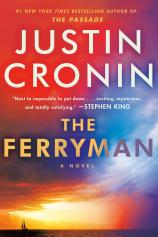The Ferryman
Review
The Ferryman
Readers familiar with Justin Cronin’s epic trilogy that began with THE PASSAGE will find some familiar themes and notes in his latest novel. A world in very rapid decline, simmering social tensions, extreme solutions, and complex and nuanced relationships: Cronin’s newest apocalypse shares much with his previous one. Still, THE FERRYMAN is unique in its settings and mechanics. It is a sweeping drama with some huge surprises and fascinating characters.
After a strange prologue, which is poetic and violent, the novel opens in Prospera, an archipelago state where citizens live on two distinct landmasses, divided by socioeconomics. Proctor Bennett lives on Prospera proper and works as the director of the Department of Social Contracts. Colloquially he is known as a Ferryman as he brings people to the ferry, which takes them away at the end of their lives. Upon reaching this point, as determined by both mental deterioration and some tech-metrics, individuals are brought to the Nursery so that, through some unclear process, they can be returned to Prospera as a new “ward.” Proctor’s work is part of this life cycle.
"THE FERRYMAN is unique in its settings and mechanics. It is a sweeping drama with some huge surprises and fascinating characters."
The poor and working class Prospereans, those who serve the elite, powerful and creative classes, live in the Annex. The Annex is accessible only by bridge, and people live there under the watchful eye of guards. Though the ruling Prospereans consider their home, isolated from recent climate catastrophes, to be a utopia or paradise, those in the Annex know otherwise. Well aware that they are being treated unfairly, they are increasingly turning to a religion called Arrivalism and considering armed rebellion if peaceful protest doesn’t work. Unbeknownst to most of the people outside the Annex, they are being spied on, and their society is on the verge of revolution.
Amidst the rising pressures, Proctor has personal issues to deal with. Since the death of his daughter, the relationship between himself and his wife, Elise, has been strained. Things get much worse when he has to escort his own father to the ferry. Malcolm has cryptic and disturbing words for Proctor, which set off a chain of discoveries and revelations that, quite literally, call all of reality into question. What did Malcolm’s last words mean? What really happened to Proctor’s mother, Cynthia? What can he learn from the art of a mysterious painter in the Annex? What truths do the leaders of Prospera hide? And what if Prospera is not at all what it seems?
The last third of the book takes an unexpected turn as the veil over Prospera is lifted, both for Proctor and for readers. Cronin shifts to a different kind of sci-fi setting yet maintains the central concepts and ideas. The characters are the same, though their true identities have been revealed. Some of the mechanisms get a bit fuzzy here, but THE FERRYMAN remains compelling throughout. Surely the real world of the novel, physically contained yet vast in scope, made perfect sense to Cronin. But it is not always clearly rendered on the page, and the plot twists on itself a couple of times with a few weird or diversionary scenes.
Still, it is worth sticking with Cronin throughout it all as he explores some universals via quite particular methods. At the fore are questions about love, grief and the power of dreams. Overall, this is a tale full of relatable human experience and emotion, told with great imagination and ambition.
Reviewed by Sarah Rachel Egelman on May 5, 2023




